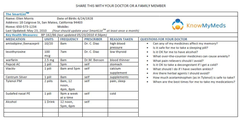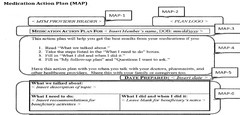Medication Therapy Management (MTM) – Flashcards
Unlock all answers in this set
Unlock answersquestion
What does medication therapy management entail (9 things)?
answer
1) Medication therapy reviews (educate patient on how to use medication, look for therapy duplications, make sure each disease state is being treated with medication) 2) Pharmacotherapy consults (talk with patients and their providers about the best medication for their condition) 3) Disease management coach/support (talk about lifestyle choices, exercise, diet, etc) 4) Pharmacogenomics (choosing medication therapy based on genetic profile) 5) Anticoagulation management 6) Other clinical services (diabetes, weight loss, smoking cessation) 7) Medication safety (how to use safely and dispose of it safely) 8) Health, wellness, public health 9) Immunizations (prevention of disease)
question
Under what law was medication therapy management developed?
answer
Medication Prescription Drug Improvement and Modernization Act of 2003 -began as a centers for medicare/medicaid approved service for qualifying Part D beneficiaries (for persons over 65, must sign up for medicare part D) -pharmacists receive reimbursement for services
question
Why is there a need for MTM?
answer
1) High drug utilization among the elderly 2) Increasing rates of drug-related mortality and morbidity 3) Medication problems, complications and hospitalizations 4) Pharmacist's interventions can lower medical costs (Asheville Project)
question
Definition of MTM
answer
A service or a distinct group of services that optimize therapeutic outcomes for individual patients.
question
Purpose of MTM
answer
-to promote collaboration and enhance communication between other healthcare providers (strengthen the triad of patient, doctor, and pharmacist) -empower patient to be self-advocates
question
What is the difference between the general definition of MTM and the pharmacist's definition of MTM?
answer
The general definition states that anyone can provide MTM services, including nurses and physicians.
question
An established MTMP must ensure:
answer
(as of January 1, 2013) -ensure that Part D drugs prescribed to targeted beneficiaries are appropriately used to optimize therapeutic outcomes through improved medication use -reduce risk of adverse events, including adverse drug interactions -developed in cooperation with licensed pharmacists and physicians -may be furnished by pharmacists or other qualified providers -is coordinated with other chronic care improvement program (now known as medicare health support)
question
Who does MTM target
answer
1) Medicare Part D beneficiaries 2) State medicaid programs 3) Commercial health insurance 4) Self-paying patients 5) long-term care/assisted living
question
Medicare Part D MTM Eligibility Criteria
answer
1) Must have 2-3 of the following chronic disease states: diabetes, hypertension, hyperlipidemia, asthma/COPD, depression, heart failure 2) Medications: must be taking 2-8 or more different medications 3) Annual medication costs: 2014-$3,017 (drug cost for that patient per year, real cost) 4) Sponsors are encouraged but not required to offer services to patients filling at least 1 anti-hypertension medication (hypertension is leading cause of morbidity and mortality in the U.S.)
question
5 core elements of MTM
answer
1) Medication Therapy Review 2) Personal Medication List 3) Medication-Related Action Plan 4) Intervention and/or referral 5) Documentation and Follow Up
question
Medication Therapy Review
answer
1) Gather patient data (demographics, age, allergies, health status, medical history) 2) Gather medication data; reconcile all medication data (match each medication to a disease state) 3) Identify and prioritize medication related problems 4) create appropriate plan to resolved medication related problems
question
Personal Medication List; what information should it contain?

answer
-completed by the patient or the pharmacist for the patient to take home and to all appointments (needs to be in layman's terms) -tells patient what medication is, indication, directions, allergies -tool for patient self-management
question
MTM Process
answer
A) Assessment 1) Evaluate appropriateness, effectiveness, safety, and compliance with medication 2) Identify drug therapy problems B) Care Plans 1) Resolve drug therapy problems 2) Establish goals of therapy 3) Interventions C) Follow up 1) Evaluate progress in meeting goals of therapy 2) Record actual patient outcomes 3) Reassess new problems
question
Medication Related Action Plan (MAP)

answer
A document with action steps for the patient -help achieve specific health goals and self-manage medication-related issues -keep it simple -list high priority items first
question
Intervention and/or Referral
answer
(A) For Patient's Provider (1) Recommend therapeutic interchange (2) Discuss drug interaction (3) Recommend addition therapy (4) Discuss therapy duplication and discontinuation (B) For Patient (1) Recommend OTC (2) Recommend Immunization (3) Encourage smoking cessation or refer to program
question
Follow up and documentation
answer
-SOAP format -assist with billing -facilitates communication between pharmacists and other healthcare providers
question
Billing
answer
(1) Platforms -Mirixa, OUTCOMES, Medmonitor (2) CPT Codes -99605: Initial encounter (15 minutes) -99606: Follow-up encounter (15 minutes) -99607: For additional 15 minutes during initial or follow up encounter
question
CMR (comprehensive medication review)
answer
Entire process of gathering patient information, patient's medication information, identifying drug related problems, developing a prioritized list of medication related problems, and creating a plan to resolve them
question
Requirements of a CMR
answer
-must be person-to-person or via tele health (telephone) -cannot be via e-mail; must be real-time -medicare part D beneficiaries must receive an annual CMR
question
Purpose of CMR
answer
To improve patient's knowledge about medications, OTCs, herbal supplements, etc. To identify and resolve drug related problems. To empower patients to self manage their medications and health conditions.



